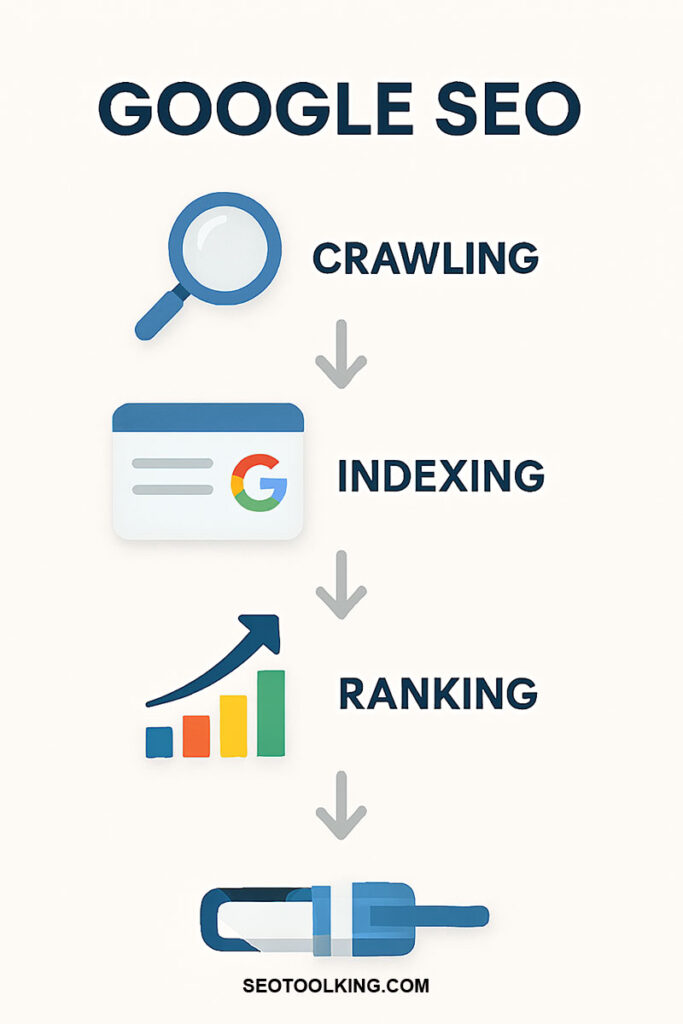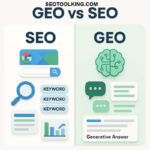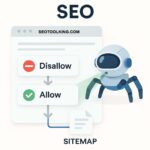SEO Optimize for Google: Complete Guide
Google handles over 8.5 billion searches daily, making it the most important platform for SEO. If your website isn’t optimized for Google, you’re missing out on traffic, leads, and revenue.
This step-by-step SEO mastercourse will teach you how to optimize for Google using proven strategies, examples, and the right tools from Small-SEO-Tool.com.
You will learn
- Introduction to Google SEO
- Understanding How Google Search Works
- Google’s Core Ranking Factors
- On-Page SEO Optimization for Google
- Off-Page SEO Strategies for Google
- Technical SEO for Google
- Mobile-First Indexing & Mobile SEO
- Google’s E-E-A-T Principles (Experience, Expertise, Authority, Trust)
- Content Optimization for Google Search
- Keyword Research for Google SEO
- Long-Tail Keywords & Voice Search Optimization
- Optimizing Title Tags & Meta Descriptions for Google
- Image SEO for Google (Alt Text, Filenames, Compression)
- Website Speed Optimization (Core Web Vitals)
- Structured Data & Schema Markup for Google Rich Snippets
- Backlink Strategies for Google Rankings
- Local SEO Optimization for Google My Business
- Google Algorithm Updates (Past, Present & Future Trends)
- SEO Tools to Optimize for Google (Free on Small-SEO-Tool.com)
- Tracking SEO Performance with Google Analytics & Search Console
- Common SEO Mistakes to Avoid on Google
- Case Studies: Websites Optimized for Google Success
- Advanced SEO Strategies for 2025 & Beyond
- SEO Checklist: Optimize for Google in 2025
Introduction to Google SEO
SEO (Search Engine Optimization) is the process of improving your website so it ranks higher on Google search results. Since Google dominates the market, most SEO strategies are designed to align with Google’s algorithm.
Internal Backlink: Run a free SEO Audit Tool to check if your site is Google-optimized.

Understanding How Google Search Works
Google uses crawlers (Googlebot) to scan websites, indexes the content, and then ranks pages based on 200+ factors.
- Crawling: Finding new pages.
- Indexing: Storing pages in Google’s database.
- Ranking: Displaying the most relevant results.
Google’s Core Ranking Factors
- Content relevance & quality
- Backlinks & authority
- Mobile-friendliness
- Page speed (Core Web Vitals)
- User engagement signals (CTR, bounce rate, dwell time)
On-Page SEO Optimization for Google
- Optimize title tags & meta descriptions
- Use header tags (H1, H2, H3) properly
- Add internal linking to relevant pages
- Use Keyword Density Checker to avoid over-optimization
Off-Page SEO Strategies for Google
- Build high-quality backlinks
- Engage in guest posting
- Social signals & brand mentions
- Use Backlink Checker to analyze links
Technical SEO for Google
- Fix crawl errors with Google Search Console
- Use HTTPS (secure sites rank higher)
- Create XML sitemaps & robots.txt
- Test pages with Mobile-Friendly Test
Mobile-First Indexing & Mobile SEO
Google ranks sites based on the mobile version first.
✅ Responsive design
✅ Fast mobile loading
✅ Easy navigation
Google’s E-E-A-T Principles
Google evaluates websites based on:
- Experience
- Expertise
- Authority
- Trustworthiness
Example: A health blog should have expert authors & references.
Content Optimization for Google Search
- Use long-form, in-depth content (2,000+ words).
- Focus on search intent (informational, navigational, transactional).
- Add multimedia: images, videos, infographics.
Keyword Research for Google SEO
- Use tools like Keyword Research Tool.
- Find high-volume, low-competition terms.
- Target user intent-based keywords.
Long-Tail Keywords & Voice Search Optimization
Voice queries are longer and conversational.
Example: Instead of “pizza near me” → “Where can I get the best pizza near me?”
Optimizing Title Tags & Meta Descriptions for Google
- Titles: 50–60 characters, primary keyword first.
- Meta descriptions: 150–160 characters, action-oriented.
- Use the Meta Tag Generator.
Image SEO for Google
- Use descriptive filenames.
- Add alt text with keywords.
- Compress images for speed (WebP).
Website Speed Optimization (Core Web Vitals)
Google ranks sites based on Core Web Vitals:
- LCP (Largest Contentful Paint)
- FID (First Input Delay)
- CLS (Cumulative Layout Shift)
Structured Data & Schema Markup
Adding schema helps Google create rich snippets.
Example: Reviews, FAQs, products.
Backlink Strategies for Google Rankings
- Earn links from authority websites.
- Use broken link building.
- Submit to relevant directories.
Local SEO Optimization
- Claim & optimize Google My Business.
- Add NAP (Name, Address, Phone) consistently.
- Use local keywords (“SEO services in London”).
Google Algorithm Updates
- Panda (content quality)
- Penguin (link spam)
- RankBrain (user intent)
- Helpful Content Update (2022–2025)
SEO Tools to Optimize for Google
Tracking SEO Performance
- Google Analytics: Traffic, engagement.
- Google Search Console: Impressions, CTR, rankings.
Common SEO Mistakes to Avoid
❌ Keyword stuffing
❌ Duplicate content
❌ Ignoring mobile SEO
❌ Poor site speed
Case Studies
📌 A blog optimized content with long-tail keywords → traffic grew 80% in 6 months.
📌 A local business optimized GMB + citations → 3X increase in calls.
Advanced SEO Strategies 2025
- Optimize for AI-driven search (Google SGE).
- Focus on user experience signals.
- Invest in video SEO (YouTube is Google-owned).
SEO optimize for Google, Google SEO guide, how to rank higher on Google, SEO 2025 strategies, Google ranking factors, on-page SEO, technical SEO, small seo tools
SEO Checklist 2025
✅ Mobile-friendly design
✅ Keyword-rich titles & descriptions
✅ Fast site speed (Core Web Vitals)
✅ High-quality backlinks
✅ Local SEO optimization
✅ E-E-A-T signals
FAQ
Q1: How long does it take to rank on Google?
3–6 months, depending on competition & optimization.
Q2: What is the most important Google SEO factor?
Content quality & backlinks.
Q3: Does Google penalize duplicate content?
Yes, via the Panda algorithm.
Q4: Do meta descriptions affect rankings?
Not directly, but they improve CTR.
Q5: How can I check if my site is optimized for Google?
Run the SEO Audit Tool.
Conclusion & Next Steps
Google SEO is constantly evolving, but the fundamentals remain the same:
- Deliver quality content.
- Provide a great user experience.



